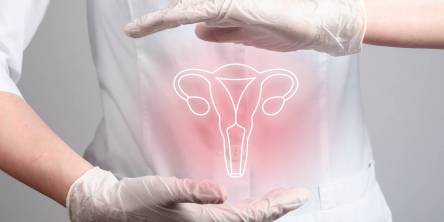6 Facts About Periods That You Should Be Aware Of
Throughout your life, you may anticipate getting your period roughly 450 times. Even if you've gotten the hang of your cycle, there's a good possibility that some menstruation mysteries remain unanswered. Maybe your cycle is abnormally lengthy or short, or it has side effects like PMS, and you're wondering if what you're going through each month is typical. Or maybe you've noticed some new symptoms, such as excruciating cramps or a thicker flow, and you're not sure if you should notify your OB-GYN.
It's crucial to pay attention to what's typical and what isn't during your period since variations might reveal information about your general health. Moreover, there are a lot of myths and misconceptions about periods that can have a negative impact on your health and well-being as well. That’s why we have gathered these six facts about periods that you should be aware of.
1. Your period will take up roughly ten years of your life
The average American woman will have roughly 450 periods throughout her lifetime, from the start of her first cycle until menopause. That's a lot of punctuation. When you add it all up, the average woman will spend nearly 10 years — or 3,500 days — of her life menstruating. In terms of period goods, this translates to about 11,000 tampons used by the average woman in her lifetime.
2. A missing period doesn't automatically indicate that you are pregnant
Another myth is that missing your period inevitably signifies you're pregnant, whereas it might happen for a variety of reasons. Hormone imbalances, stress, or even your body weight may all affect your menstrual cycle, so it's usually a question of looking at your lifestyle and paying close attention to your symptoms to figure out what's actually going on. However, it would be better to take a pregnancy test just to be sure.
3. Not all menstrual cycles are 28 days long.
Several period myths claim that your period lasts for 28 days. But the reality is that a woman's menstrual cycle might last anywhere from 21 to 35 days, depending on her age and other health conditions.
Although the normal menstrual cycle is 28 days, a shorter or longer period does not always indicate that your health is in jeopardy. A cycle that differs from the average of 28 days is considered acceptable and healthy by providers as long as it is common and predictable.
4. Severe pain during periods can manifest serious health issues
Many women experience dysmenorrhea (pain during periods) that occurs as the result of contractions in the uterus that help shed the uterine lining. Period pain can range from slight discomfort to excruciating anguish.
If you don't normally have cramps or agony, but suddenly feel as if someone is tying your uterus in a knot every month, you should be concerned. Uterine fibroids (benign growths in the uterus) and endometriosis (when uterine tissue or tissue that looks like uterine tissue develops outside the uterus) are two major conditions that can cause severe pain.
5. It is possible to become pregnant while on your period
You are not protected from pregnancy by your period. For example, you might ovulate before your period ends or within a few days of the blood stops. Because sperm may stay in your body for up to three days, having intercourse during your period could result in pregnancy. No matter what time of the month it is, use a condom or other type of birth control to avoid an unwanted pregnancy.
6. Cold weather can make periods more painful
Here's another cause to lament the end of summer! As the days become shorter and colder as winter approaches, you may notice that your period becomes more unpleasant. This is due to a decrease in vitamin D intake, which is a mood and immune system booster. On days when your period pain is unbearable, being outside for an hour or two might help to alleviate PMS symptoms and make you feel better.
Similar Articles
Uterine fibroids are benign tumors that develop in the uterine muscle tissue. According to the US Office on Women's Health (OWH), fibroids can grow as a single tumor or as a cluster in the uterus, and they can be as small as an apple seed or as large as a grapefruit.
Your pregnancy test came back positive, and nothing, not even early pregnancy symptoms like morning sickness or exhaustion, can dampen your spirits. However, it is natural to worry about what to do when you discover you are pregnant.
A breast lift, like any other operation, involves skin incisions. Scarring occurs when your skin generates new tissues and mends the wound after an incision. There are, however, measures to reduce scarring before, during, and after a breast lift.
The cervix's proper functioning is crucial to a woman's reproductive health and fertility. However, most women do not know anything or have a limited understanding of it. As a result, there are numerous misconceptions surrounding cervical health.
Do many nighttime wake-up calls or interruptions to your daytime activities result from frequent bathroom visits? Six to seven trips to the bathroom in a 24-hour period is normal for most people. However, urinating more frequently could be a symptom of a serious problem.
The cervix is the lower part of the womb (uterus), where the fetus develops during pregnancy. A tiny hole in the cervix widens during birthing. It also lets menstrual blood exit her body.
Shatavari is a very renowned ayurvedic herb containing plenty of health benefits. It is also known as the universal rasayan. The word shatavari refers to a woman with a hundred husbands signifying the traditional use of this herb to boost the reproductive system of the body.
Despite the fact that around half of the world's population experiences, will experience, or has experienced menstruation, misunderstandings regarding this biological process remain.
Annual gynecological check-ups are essential for every woman to stay healthy. However, there are a lot of conditions that require medical attention. You should understand that the sooner you will be diagnosed and treated, the easier and more effective the treatment will be









